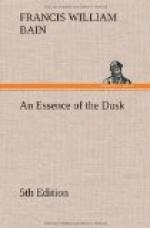[2] This method of disposing of objectionable suitors is unfortunately not available in Europe. A great swallowing capacity is a feature of the species Rakshasa. The “coming as soon as thought of” (dhyatagata) is the Indian equivalent of “rubbing the lamp” in the Arabian Nights.
[3] Who ever loved that loved not at first sight? Every Oriental would side with Shakspeare in this matter: love, in the East, is not love, unless it comes like a flash of lightning.
[4] This might be either that of a woman or a snake, for the Nagas, to whom she belonged, waver between the two. The Naga, it may be well to remind the reader, is a being possessed of magic powers, especially that of glamour or blearing the eye, which appealed so powerfully to Spenser and Sir Walter Scott.
[5] Krishna, whose colour, it is to be noted, is blue.
[6] In every sense of the word:
mohajalamaya is stronger
than any English equivalent.
[7] The Underworld, the home of the snakes.
II.
So as Aja stood upon the wall, looking out over the desert, suddenly all vanished from before his eyes. And he saw before him no city, and no desert. But he found himself in a dusky wood, thick with tall tamala[8] trees, and lit by a light that was neither that of the sun nor that of the moon. And all around him huge red poppies waved gently without a wind, mixed with great moon-lotuses, whose perfume went and came by turns as it hung on the heavy air. And under the shadow of the black leaved trees large bats flew here and there with slow and noiseless flap, and on the branches monstrous owls with topaz eyes like wheels of flame sat motionless, as if to watch. And a dead silence like that of space whence all three worlds have been removed left Aja nothing else to hear but the beat of his own heart. And the hair rose up upon his head with sheer amazement. And he said to himself: Ha! what new wonder is this, and what has become of the city wall? And where in the world have I got to now, and how? Now let me be very wary, for the danger is evidently coming near.
[8] A tree with very black bark
and white blossoms, dear to
exotic poets, such as e.g.
Jayadewa.




